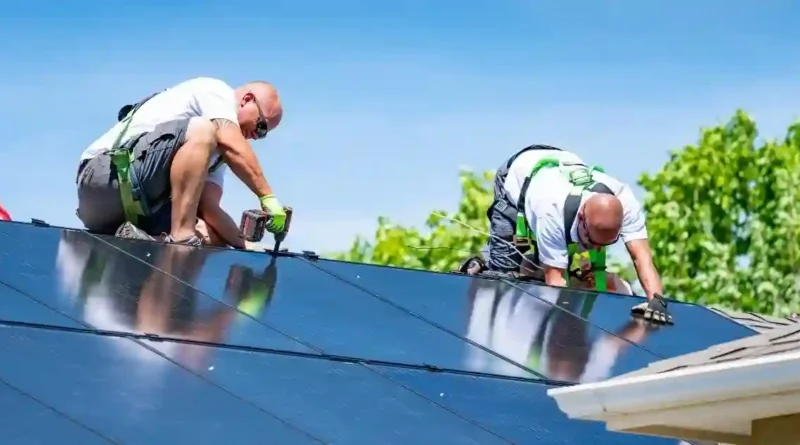Solar Panel Installation and Home Insurance: What You Need to Know
Solar panels have become increasingly popular as a sustainable energy source in recent years. Homeowners across the globe are eager to harness the power of the sun to reduce their carbon footprint and lower energy bills. While the benefits of solar panel installation are clear, there is often confusion surrounding the impact of such installations on home insurance. In this article, we will delve into the crucial aspects of solar panel installation and its relationship with home insurance, providing you with the information you need to make informed decisions.
The Benefits of Solar Panel Installation
Before we delve into the intricacies of home insurance, it’s important to understand why homeowners are drawn to solar panel installation in the first place. Solar panels offer a range of benefits, including:
- Reduced Energy Bills: Solar panels generate electricity from sunlight, significantly reducing your reliance on conventional energy sources. This leads to lower monthly energy bills and potential long-term savings.
- Environmental Benefits: Solar panels are a clean and renewable energy source, producing no harmful emissions. By using solar energy, homeowners can reduce their carbon footprint and contribute to a more sustainable future.
- Increased Property Value: Solar panel installations can enhance the resale value of your home. Buyers often view solar panels as a valuable asset, and they may be willing to pay a premium for a property with an existing solar power system.
- Government Incentives: Many governments offer incentives, tax credits, and rebates to encourage solar panel adoption. These financial benefits can offset the initial installation costs.
- Energy Independence: Solar panels provide a degree of energy independence, reducing your vulnerability to power outages and fluctuations in energy prices.
Now that we’ve established the advantages of solar panel installation, let’s explore how it might affect your home insurance.
Home Insurance Basics
Home insurance, often referred to as homeowners’ insurance, is designed to protect you financially in the event of property damage, theft, or liability claims. It typically includes coverage for your dwelling, personal belongings, liability, and additional living expenses. When it comes to solar panel installation, there are several key considerations that homeowners should keep in mind.
- Solar Panel Coverage: Homeowners should review their insurance policy to determine whether solar panels are covered under the dwelling coverage. While solar panels are considered a permanent fixture, it’s essential to confirm that they are explicitly included in your policy.
- Increase in Dwelling Value: Solar panels increase the value of your property. As a result, it’s crucial to adjust your dwelling coverage to account for this added value. Failing to do so may leave you underinsured in the event of a covered loss.
- Liability Coverage: Solar panel installations also come with potential liability risks. If a worker is injured while installing or maintaining your solar panels, you may be held liable. Ensure that your liability coverage adequately protects you in such situations.
- Equipment and Personal Property Coverage: Solar panels are a significant investment, so it’s wise to check whether they are covered under your personal property coverage in case of damage or theft. Additionally, consider whether your insurance policy covers the solar panel equipment itself.
- Solar Panel Damage: Assess whether your policy covers damage to your solar panels caused by events like hailstorms, hurricanes, or other natural disasters. Some insurance policies may require you to purchase a separate endorsement for this coverage.
- Additional Coverage Options: Depending on your insurance provider and the location of your home, you may have access to additional coverage options specific to solar panels. These can include coverage for the cost of removing and reinstalling solar panels in case of a covered loss.
Installing Solar Panels: Insurance Considerations
When you decide to install solar panels on your home, there are specific insurance-related steps you should take to ensure you’re adequately protected:
- Notify Your Insurance Provider: As soon as you decide to install solar panels, contact your insurance provider to inform them of your plans. This allows them to assess the impact on your policy and make any necessary adjustments.
- Increase Dwelling Coverage: To account for the increased value of your home due to the solar panel installation, work with your insurer to adjust your dwelling coverage appropriately. This step ensures that you’re adequately protected in the event of a covered loss.
- Review Liability Coverage: Discuss your solar panel installation with your insurance provider to ensure that your liability coverage is sufficient to protect you in case of accidents or injuries related to the installation.
- Evaluate Equipment Coverage: Confirm whether your policy covers the solar panel equipment itself in case of damage or theft. If not, consider purchasing additional coverage or endorsements for the equipment.
- Assess Solar Panel Damage Coverage: Understand the extent of coverage your insurance policy provides for damage to your solar panels caused by various perils, including natural disasters. If needed, consider purchasing additional coverage.
- Explore Solar Panel-Specific Options: Inquire about any solar panel-specific coverage options offered by your insurance provider. These options may provide added protection and peace of mind.
Conclusion
Solar panel installation is an excellent way to harness clean energy and reduce your environmental footprint. However, it’s essential to consider the implications for your home insurance to ensure that you’re adequately protected. By notifying your insurance provider, adjusting your coverage, and exploring relevant endorsements, you can enjoy the benefits of solar panels without worrying about potential insurance gaps. Remember that each insurance policy may have different terms and conditions, so it’s crucial to discuss your specific situation with your insurance provider to make sure you have the right coverage in place. With proper planning, you can have both solar panels and comprehensive home insurance coverage that provides peace of mind and financial protection.




